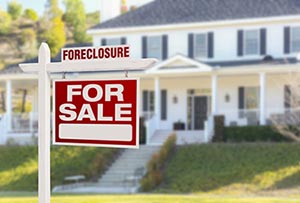Your home is likely your biggest asset, and your mortgage your biggest debt. Whatever you do with that asset and that debt has a big effect on your present and future financial life. If you are having financial trouble paying the mortgage it only makes sense to fully understand your options about your home and its mortgage. You likely have options and advantages you don’t know about.
DOESN’T IT MAKE SENSE TO SELL YOUR HOME IF YOU CAN’T AFFORD IT AND TO PREVENT ITS FORECLOSURE?
Maybe. But this question leads to two important other questions:
- Could you actually afford your home with the help of either a Chapter 7 “straight bankruptcy” or a Chapter 13 “adjustment of debts”?
- Are there ways to sell your home and avoid its foreclosure but to sell on a timetable that would maximize its value and better fit into your life?
HOW COULD BANKRUPTCY HELP ME KEEP MY HOME?
If you are current or not too far behind on the mortgage or property taxes, Chapter 7 could help as follows:
- As soon as your bankruptcy case is filed you can stop paying all or most of your other debts, and the creditors can’t try to collect on them. Then about 3 months later all or most of those other debts are discharged—permanently written off. This often frees up enough cash flow so that you can more easily afford to make your mortgage payments. Chapter 7 allows you to focus your financial resources on your home.
- If you are somewhat behind on your mortgage or property taxes, your mortgage lender will usually be willing to enter into a “forbearance agreement.” That’s an arrangement in which you agree to catch up on the mortgage and/or taxes on a schedule of payments. In return the mortgage lender agrees not to foreclose—to forbear asserting its rights—as long as you pay as agreed. Different lenders have different policies on this, but in general lenders tend to give you about a year to catch up on your back payments.
WHAT IF I’M SO FAR BEHIND ON MY MORTGAGE OR PROPERTY TAXES THAT I COULDN’T POSSIBLY CATCH UP WITHIN A YEAR OR SO?
Then Chapter 13 would likely be a better solution. It would give you much more time to catch up, as long as 5 years.
Also, Chapter 13 gives to power over your mortgage lender that Chapter 7 cannot give. In a Chapter 7 case you are at the mercy of the mortgage lender as to how much time you’ll have to catch up. But in Chapter 13 you are the one who proposes the length of time and terms of payment, based on your budget and on your other creditor responsibilities. Your lender may object but usually it doesn’t have grounds for objection as long as your Chapter 13 plan shows that you will be current by the end of the case. Then of course you have to comply with the plan in order catch up on time and save your home.
BUT IF MY HOUSE IS “UNDERWATER”—I OWE MORE THAN IT’S WORTH? IS IT WORTH WORKING SO HARD TO CATCH UP INSTEAD OF JUST SELLING THROUGH A SHORT SALE NOW?
Excellent question. Yes, sometimes paying thousands or even tens of thousands of dollars over the course of years to catch up on a mortgage is not worthwhile. Selling instead on a short sale may get you out of a bad situation quicker and easier. A short sale is one in which your lender accepts less than its full balance to settle the debt and allow a sale to go through.
But short sales have their risks:
- You have to make sure that your lender does not have the right to pursue you afterwards for the portion of the debt left unpaid.
- If you have a second mortgage or any other lien on the real estate, those obligations have to be taken care of somehow.
- A short sale would hurt your credit, likely worse than if you succeeded in hanging onto your home or selling it for a higher price a few years later and paying off your mortgage in full.
- You may have to pay income taxes on the amount of debt forgiven.
- A short sale can be very challenging to pull off. So don’t count on it as a solution until it is finalized.
- Rushing into a short sale before your home has gotten enough market exposure to get the highest price likely leaves money on the table that you can sorely afford to waste.
Short sales have advantages and disadvantages that turn on your unique circumstances. You truly need the advice of a debtor/creditor lawyer to sort through them as they apply to you. A short sale may well NOT be the best solution for your home compared to your other options.
WHAT HELP CAN BANKRUPTCY GIVE ME TO DEAL WITH MY SECOND MORTGAGE, WHICH I’M ALSO BEHIND ON?
Chapter 7 doesn’t provide any direct help with a second mortgage, other than get rid of other debts so that hopefully you could better afford the second mortgage payments.
But Chapter 13 may be able to help very significantly with a second mortgage. If your FIRST mortgage has a higher balance than the value of your home, then the second mortgage is effective not secured at all by the home. All of the home’s value, and then some, is taken up by the first mortgage debt, leaving none for the second.
In this situation, under Chapter 13 the bankruptcy court can declare the second mortgage to be unsecured. Then it can be treated accordingly. You can stop making the second mortgage payments. The second mortgage debt is lumped in with all of the “general unsecured” debts, which you only pay to the extent you can afford to do so. Then at the end of your Chapter 13 case whatever portion hasn’t been paid is forever discharged.
This “second mortgage stripping” can make keeping your home much less expensive to pay for each month. It can save you many thousands or even tens of thousands of dollars over time. And it bring you much closer to building equity in your home.
This is a prime example why it makes sense to find out about your bankruptcy options instead just blindly selling your home.
WHAT ABOUT IF I’M BEHIND ON PROPERTY TAXES?
You may be at risk of property tax foreclosure, but you have to be very far behind for that to happen.
What’s more immediately a problem is almost certainly being behind on property taxes is grounds for foreclosure of the mortgage itself.
Just like with the mortgage debt, Chapter 7 buys you some time, while Chapter 13 buys much more time. With Chapter 7 you’d likely be given a few months to catch up on the unpaid property taxes (as well as any unpaid mortgage payments). With Chapter 13 you’d be given as long as 5 years to catch up.
BUT WE HAVE DECIDED THAT WE HAVE TOO MUCH HOUSE AND NEED TO DOWNSIZE, SO HOW COULD CHAPTER 13 HELP US?
It buys you time so that you are not rushed to sell the home immediately, before the market’s right, before you’ve prepared it for sale, and/or before your life circumstances make it the right time to sell.
If you are behind in payments, and even on the brink of foreclosure, Chapter 13 would stop the pending foreclosure, or stop one from being started. Then you would usually be able to market the home on your own schedule, months later.
HOW ABOUT SEVERAL YEARS LATER? BECAUSE OF LIFE CIRCUMSTANCES (SUCH AS KIDS IN LOCAL SCHOOLS) WE’D LIKE TO STAY IN OUR HOME FOR THE NEXT COUPLE OF YEARS, AND THEN DOWNSIZE AT THAT POINT. DOES CHAPTER 13 ALLOW FOR THAT?
It likely would. It depends on your ability to make the regular monthly payments (just about always required), and to pay catch-up payments in the meantime.
HOW DOES ALL THIS HELP ME SHORT-TERM?
It’s probably unwise to sell your biggest asset for whatever you could get for it in a distress sale. We all make financial mistakes in life and have some bad luck. But you don’t want to compound the mistakes and bad luck with a bad decision now. You owe it to yourself to get good advice about your options, so that you can choose smartly among them.
If you do this you’ll have the peace of mind that comes from knowing that you are dealing with your situation responsibly. You get a game plan and a timetable for dealing with your home in the way that is the best for you and your family.
If you do decide to file a Chapter 7 or Chapter 13 case, you’d get the relief of knowing that any pending foreclosure is being stopped. Your creditors can no longer harass you. You are putting into action an option with certain benefits that you need. You are taking charge of your own destiny.
AND HOW DOES THIS HELP ME LONG-TERM?
If you do choose to save your home with either type of bankruptcy, and you succeed, you will have prevented the stain of a home foreclosure on your overall credit record and on your special mortgage-related record. You would have saved what perhaps is your best opportunity for building future equity, future wealth.
FREE Phone or Office Consultation

Attorney Duenas’ approach is to present those taking advantage of a FREE consultation the best possible options available to resolve their financial problems and to help them rebuild their financial future. Ms. Duenas is a member of the National Association of Consumer Bankruptcy Attorneys and has an Excellent rating among clients on Avvo.com. Her law office is also part of the Better Business Bureau and has an A rating.
As part of meeting with Norma Duenas you will fill out a questionnaire in person or online from home that will help us evaluate your financial situation and determine if bankruptcy can eliminate your debts and stop creditor collection efforts. Our founding attorney, Norma Duenas provides a free phone or office consultation up to one hour to review your facts, answer your questions, and provide you with all possible options.
If you need further assistance or to schedule a free phone or in-person consultation, please call us at 866-337-7220 or email us if calling us is not practical or it’s after hours.

